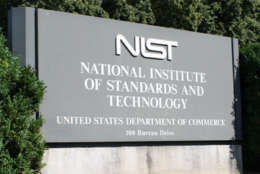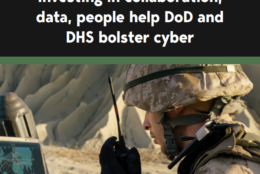Cybersecurity
-
The cybersecurity team at the National Institute of Standards and Technology (NIST), is about to finalize a new version of a signature document: The Cybersecurity Framework. Next week it holds a workshop to get one last round of input on the new framework draft. For more, Federal Drive Host Tom Temin spoke with Kevin Stine, the Chief of NIST's Applied Cybersecurity Division.
September 11, 2023 -
Lt. Gen. Robert Skinner, DISA’s director and commander of the Joint Force Headquarters-Department of Defense Information Network (JTF-DoDIN), said the agency is undertaking three separate tests of tools to better protect internet boundaries.
September 08, 2023 -
The Cybersecurity Maturity Model Certification program has been in gestation at the Defense Department longer than a baby elephant. CMMC is still not operational, but, boy, has it produced documents. Just out, new scoping documents. Do contractors need to read them? To discuss that topic, Federal Drive Host Tom Temin was joined in studio by Holland and Knight contracting attorney Eric Crucius.
September 08, 2023 -
CISA is nearly done writing the proposed rules for cyber incident reporting, while the CMMC rules may be out for comment before the end of 2023.
September 07, 2023 -
CISA’s new Secure-by-Design, Secure-by-Default principles offer a road map to guide technology providers to a more secure future. By addressing integration, automation and collaboration, agencies can improve the odds our shared technology ecosystem reaches that destination.
September 07, 2023 -
DOJ and the General Services Administration’s inspector general says Verizon’s cyber protections fell short of requirements outlined in the Trusted Internet Connections initiative from October 2017 to August 2021.
September 06, 2023 -
Colby Proffitt, a cybersecurity strategist at Shift5, explains why observability is so important to improving the security and modernizing operational technology.
September 01, 2023 -
Leaders from CISA, the Army Cyber Command and Defense’s JFHQ-DODIN share how they’re investing in all three to help improve cyber capabilities and resiliency for both public and private sector organizations.
August 30, 2023 -
Col. Michael Smith, the director of the Army’s functional management office for zero trust and director of the unified network task force, said an ongoing gap analysis will look at weapons systems and control systems to see where zero trust capabilities can fit in.
August 29, 2023 -
CISA reports that its first ever cybersecurity shared services offering is off to a hot start.
August 25, 2023 -
Vulnerability disclosure has proliferated across federal agencies in recent years. A new House bill would make them mandatory for contractors, too.
August 24, 2023 -
During this webinar, top government information security executives and industry experts will reflect on their accomplishments along with the people and technology that made these programs so successful.
August 23, 2023 -
CMMC 2.0 is bringing compliance within reach of a wider range of DoD contractors and partner organizations. But success requires those who handle CUI to understand both the changes CMMC 2.0 is bringing, and how stronger encryption and other data protection measures can be deployed to help meet these new CMMC 2.0 compliance requirements.
August 22, 2023 -
The IRS has a detailed plan for achieving a state of zero trust on its information technology networks, which is something all agencies are under obligation to do for cybersecurity.
August 21, 2023 -
The Federal Communications Commission has established a task force to deal with privacy and data protection, noting what it calls the era of always-on connectivity.
August 17, 2023












